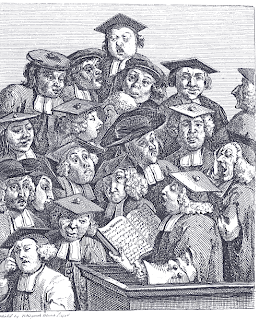Last year I
drew attention to the fact that, despite their prolific output, economists seemed to have some difficulty in making sense of more global trends –
It’s significant that the best expositions of the global economic crisis and its causes rarely come from economists……..somehow the framework within which the modern economist operates precludes him/her from even the vaguest of glimmerings of understanding of the complexity of socio-economic events. Their tools are no better than adequate for short-term work…..For real insights into the puzzles of the modern world, think rather David Harvey (a geographer) and his A Brief History of Neoliberalism (2005); John Lanchester and James Meek (novellists and writers); Susan Strange, Susan George or Colin Crouch (political science); or Wolfgang Streeck – a Koeln Professor of Sociology. All have extensive and eclectic reading; a focus on the long-term; and the ability to provoke and write clearly.
"Eclectic" is the key word; few economists are trained these days in political economy - which roots the study of economics in the wider context of history and political analysis......
Wolfgang Streeck is Director of the Max Planck Institute and an unlikely scourge of capitalism – but his texts are becoming ever more apocalyptic. He has just published another - How will Capitalism End? - a summary of whose basic thesis can be found in this 2014 New Left Review article
Wolfgang Streeck is Director of the Max Planck Institute and an unlikely scourge of capitalism – but his texts are becoming ever more apocalyptic. He has just published another - How will Capitalism End? - a summary of whose basic thesis can be found in this 2014 New Left Review article
The NLR is the favoured outlet for
Streeck’s long, clear and incisive articles eg one
in 2011 on “The Crisis of Democratic Socialism” which led to the short book Buying
Time – the delayed crisis of democratic capitalism (2013).
His latest book, however, explodes any idea of the inevitable arrival of a socialist paradise –On the contrary, his is a dystopian vision in which capitalism perishes not with a bang, but a whimper. Since, he argues, capitalism can no longer turn private vice into public benefit, its “existence as a self-reproducing, sustainable, predictable and legitimate social order” has ended. Capitalism has become “more capitalist than is good for it”.
The postwar marriage between universal-suffrage democracy and capitalism is ending in divorce, argues Streeck. The path leading to this has gone via successive stages: the global inflation of the 1970s; the explosion of public debt of the 1980s; the rising private debt of the 1990s and early 2000s; and the subsequent financial crises whose legacy includes ultra-low interest rates, quantitative easing, huge jumps in public indebtedness and disappointing growth.
Accompanying capitalism on this path to ruin came “an evolving fiscal crisis of the democratic-capitalist state”. The earlier “tax state” became the “debt state” and now the “consolidation state” (or “austerity state”) dedicated to cutting deficits by slashing spending. Three underlying trends have contributed: declining economic growth, growing inequality and soaring indebtedness. These, he argues, are mutually reinforcing: low growth engenders distributional struggles, the solution too often being excessive borrowing.
The book finishes by exploring five systemic disorders – “stagnation, oligarchic redistribution, plundering of the public domain, corruption and global anarchy…..” which Streeck talks about here and which are (very briefly) defined in this summary
Curiously,
however, the book seems to give little coverage to automation…on which a recent
article called Four
Futures offers an insightful perspective – reviewed
in the Los Angeles Review of Books – a review which also carried a good piece
on The
Supermanagerial Rich
Other Relevant Reading
David Harvey eg
http://salvage.zone/in-print/neoliberalism-as-the-agent-of-capitalist-self-destruction/ (Neil Davidson on Neoliberalism)
student
reading list;http://www.brianmilstein.com/pdfs/syllabus-TheorizingCrisis-final.pdf
